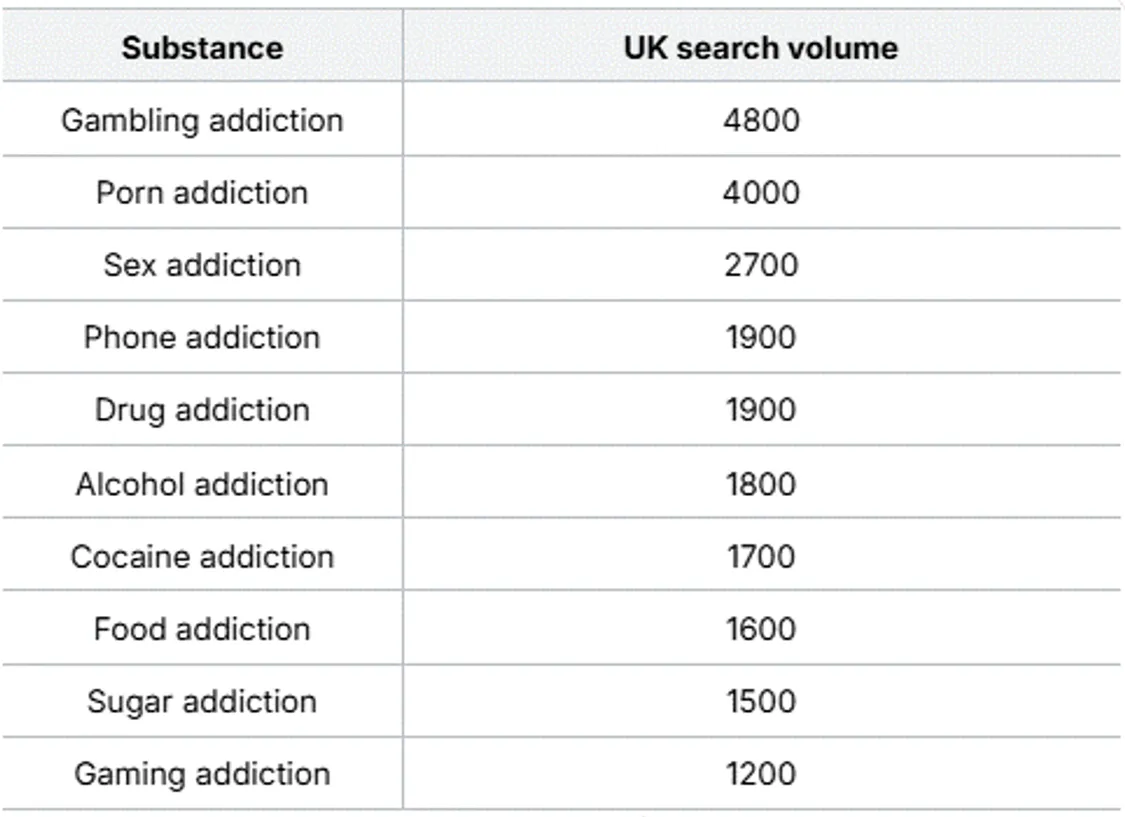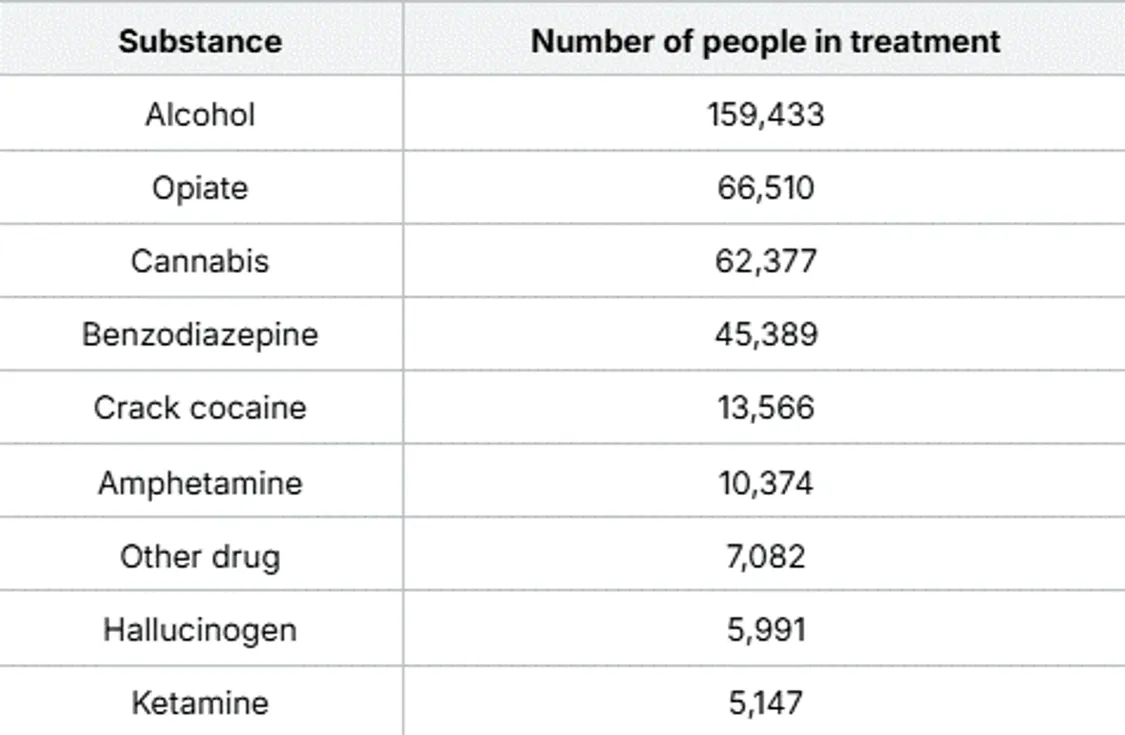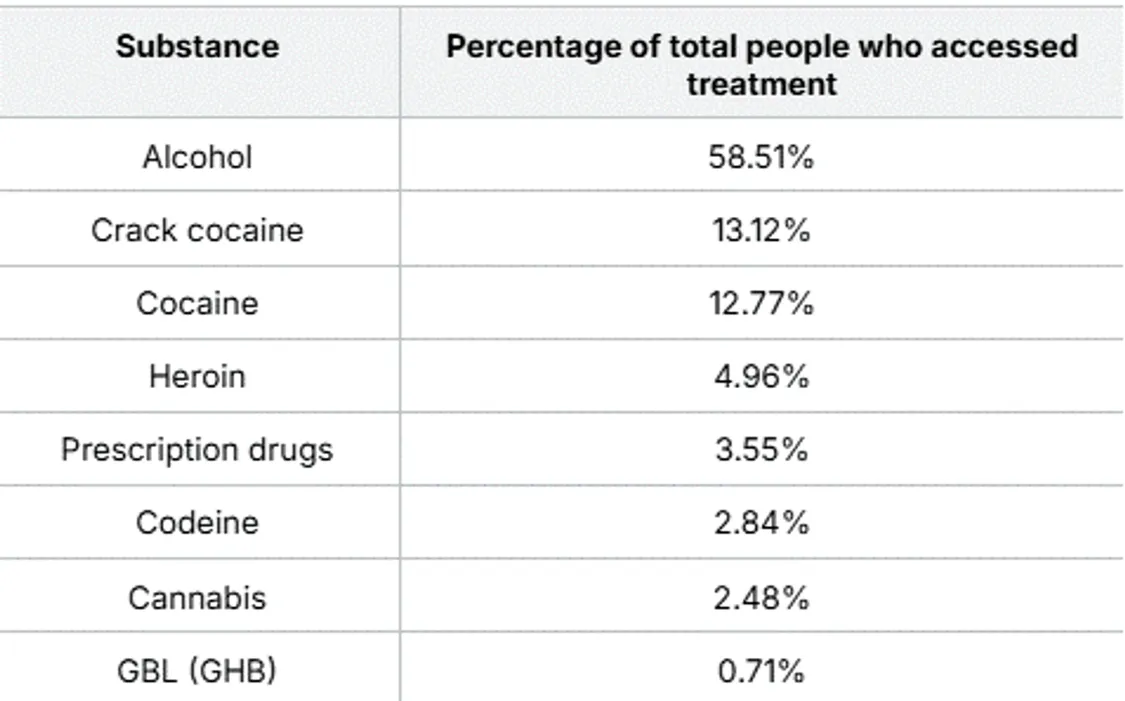07 Jul 2025
Photo by Inspa Makers on Unsplash
As funding for addiction support continues to decrease in the UK, the lack of access to services is leading many people to turn to Google rather than professionals in an attempt to find the information and support they need, especially for conditions that may have a stigma attached.
This approach not only results in a possibly inaccurate diagnosis for the individual but also causes blind spots in professional care. While the range of addictions is represented in professional treatment data, it’s unclear exactly how accurate the data is because the large number of people seeking support online are not included.
In this article, we will use a combination of rehab data, government data and expert commentary to uncover the most overlooked addictions in the UK.
The most overlooked addictions
An overlooked addiction is a case that has slipped through the cracks and is not recorded by traditional methods because people choose to search for support online rather than finding professional help.
There are a broad number of reasons why an individual may choose to seek online support, but the result is that they may never receive the professional care they may need and the number of cases across the UK is not correctly measured;
- Lack of access to medical services
- Lack of awareness of the options in their area
- Stigma or lack of confidence in discussing addiction with another person.
Top 10 most searched for addictions in the UK (Ahrefs)

Source: Ahrefs
Behavioural addictions
Unlike substance addictions, behavioural addictions are not always prominent in official data, but they generate thousands of monthly searches and affect people of all ages. Despite this need for support, many cases go undiagnosed or are misdiagnosed.
“It’s hard to say to what extent behavioural addictions are going undiagnosed in our country," Rehabs UK founder Lester Morse explains. "I was talking to a reporter who was doing a piece on shopping addiction. She mentioned that her sister was a doctor, so I asked what help her sister would prescribe if someone presented with a shopping addiction. She said her sister didn’t know! I wouldn’t be surprised if that’s the case for all behavioural addictions in the UK, apart from gambling. I doubt most people would receive an accurate diagnosis, let alone the right treatment.”
This lack of recognition often leads to inadequate support, especially in public healthcare systems.
“If a person presents with a clear understanding of the symptoms of their addiction, they might be matched with the right treatment, at least in the private sector,” said Lester. “Unfortunately, in my experience working with individuals with substance misuse disorders, they are often misdiagnosed and medicated for a range of unrelated conditions. Behavioural addictions can be even harder to detect, which significantly increases the likelihood of misdiagnosis.”
Gambling addiction
With 4,800 monthly UK searches for “gambling addiction” and 1,100 for “gambling addiction help”, gambling has nearly four times (x3.7) more monthly searches than “cocaine addiction help” (300) and is one of the most searched for addictions in the country. Despite this, the National Gambling Helpline referred just 6,155 people to gambling addiction services in England in 2021–22.
This clearly falls short of the addiction treatment services required. Government research from 2023 indicates that;
- 0.5% of the adult population in England has a problem with gambling
- 3.8% are gambling at at-risk levels
- 7% are affected negatively by other people’s gambling.
Across the UK, a 2020 YouGov treatment and support survey found that 13% of people were experiencing some level of gambling harm, with scores higher among men and younger adults.
Porn and sex addiction
Porn addiction (4,000 UK monthly searches) and sex addiction (2,700) are among the most searched for addiction types in the UK, but there is no official government data tracking cases or treatment for these issues.
A 2023 study by the sexual abuse charity Dignify asked 4,000 children between the aged 14-18 in Hertfordshire about their relationship with porn and discovered that 22% of students had viewed porn on multiple occasions. Alarmingly, of those, 20% said they believed they had a porn habit and one in 10 said they felt addicted.
Due to the perceived stigma and prevalence in young people, it is perhaps not surprising that many people with this type of addiction choose to seek help online rather than in person. This is especially true when there is a lack of government tracking to determine where support is needed.
Digital addiction
Despite growing awareness around digital addictions, it is another form of behavioural addiction that is not recognised in official government treatment data despite significant demand for help and support.
Phone addiction, smartphone addiction and mobile phone addiction are searched a combined 2,300 times per month in the UK, while internet addiction is searched 600 times.
Findings from The Millennium Cohort study, which is tracking the lives of about 19,000 people born across the UK between 2000 and 2002, suggest that there could be an even greater problem if more attention isn’t directed towards this area. 48% of its respondents either agreed or strongly agreed with the statement “I think I am addicted to social media”.
Gaming addiction
With 1,200 monthly searches and limited public health data available, public health agencies continue to overlook gaming addiction despite growing concerns.
An NHS update from March 2023 revealed that 745 people had been referred for treatment at the UK’s only gaming clinic since it opened more than three years earlier, in October 2019.
This figure feels particularly small considering that 85% of 16-24-year-olds in the UK play video games. It sounds even smaller in a global context. Video games have an estimated 3 billion players globally, of which, the World Health Organisation (WHO) estimates 4%, or 120 million people, are addicted.
Painkiller addictions
Behind alcohol, opiates are the second most treated substance addiction in the UK.
Search activity around painkiller addiction is a broad subject that is made harder as people typically search for advice relating to a specific medication. While exact figures are difficult to determine, there is no doubt that there is significant volume - a combined monthly UK search volume of 4,950 for types of painkiller addictions including;
- Codeine addiction: (700)
- Co codamol addiction: (600)
- Tramadol addiction: (450)
- Pregabalin addiction: (400)
- Diazepam addiction: (350)
Despite the volume of searches, Rehabs UK’s treatment data shows that codeine addiction accounted for just 2.48% of all people they helped from April 2024–March 2025, that same amount as prescription drugs.
“Many individuals who take these medications become dependent on them. The sad reality is that a certain percentage of these people become incredibly addicted. Breaking free from pharmaceutical addiction is nearly impossible, pharmaceuticals are among the most powerful and addictive substances on earth.” Rehabs UK founder Lester Morse explains,
“It’s the classic ‘a pill for every ill’ mentality. Drugs are easy and cheap to prescribe, and in the short term, they create the illusion of being a solution. But this approach is incredibly short-sighted.”
The most treated addictions in the UK
Despite the rise in overlooked addictions, substance dependencies remain the most treated nationwide.
Alcohol addiction is by far the most treated addiction, both through Rehabs UK and NHS pathways. It’s also highly searched, with 1,800 monthly UK searches. Cocaine addiction (1,700 searches) is also highly treated.
“I think alcohol is one of the most commonly treated addictions.” Said Lester. “This may be because, unlike other drugs that come and go over time, alcohol remains a constant. It's also the most widely used drug, and because it’s legal, there’s less stigma attached to it. As a result, people may be more willing to seek help.”
But while treatment levels are higher for substance addiction, the pattern of data relating to overlooked addictions suggests that even the most treated addiction data could be underestimating how much more help is needed than is currently available.
Substances that people in England receive treatment for

Source: gov.uk “Adult substance misuse treatment statistics 2023 to 2024: report”
Percentage of people who access treatment through Rehabs UK
Dataset from April 2024 to March 2025.

Source: RehabsUK
“I believe all addictions, from the mildest, which often go undetected, to the most severe, which cause immense harm to individuals, families, and society, are significantly underfunded at every level.” said Lester Morse.
“As a society, I think we’re still largely focused on managing the symptoms of addiction rather than addressing the root causes. That’s where the majority of funding and support seems to go. This may stem from a belief that there is either no real solution to addiction, or that the solution is too difficult or ethically problematic to enforce. As a result, the level of treatment truly required to address addiction is in very short supply.”
Invisible addictions
Some addictions are harder to see than others. While they are rarely tracked in official data and don’t create as much concern as substance addiction, these ‘invisible addictions’, ranging from social media and porn to painkillers and gambling, are causing real damage and often go untreated, partially due to them being less socially acceptable to discuss, and partly due to a lack of official research.
“It’s frightening to me how much overdiagnosis and misdiagnosis has been happening, certainly for the last couple of decades.” Says Rehabs UK founder Lester Morse. “After working in addiction for over 30 years, I’ve been shocked by how many people using behavioural addictions and everyday stimulants (not to mention hardcore drugs and behaviours) end up being diagnosed and medicated for depression.
“I’ve seen people spending entire days smoking, drinking, and consuming stimulants, then going to the doctor and being prescribed sleeping tablets, often both antidepressants and sedatives. In my opinion, a massive portion of people are being diagnosed based on their symptoms, not the underlying problem.
“With more honest assessments, we could help people take greater responsibility for their recovery and offer them accurate, effective support and treatment. Instead, too often we are treating symptoms, while people continue to get worse. From my experience, when we shift toward addressing root causes, we see real, positive outcomes and people genuinely getting better.”
If you or someone you know needs help with overlooked behavioural addictions, Rehabs UK can help. Contact our team of experts to discuss the steps towards recovery.
